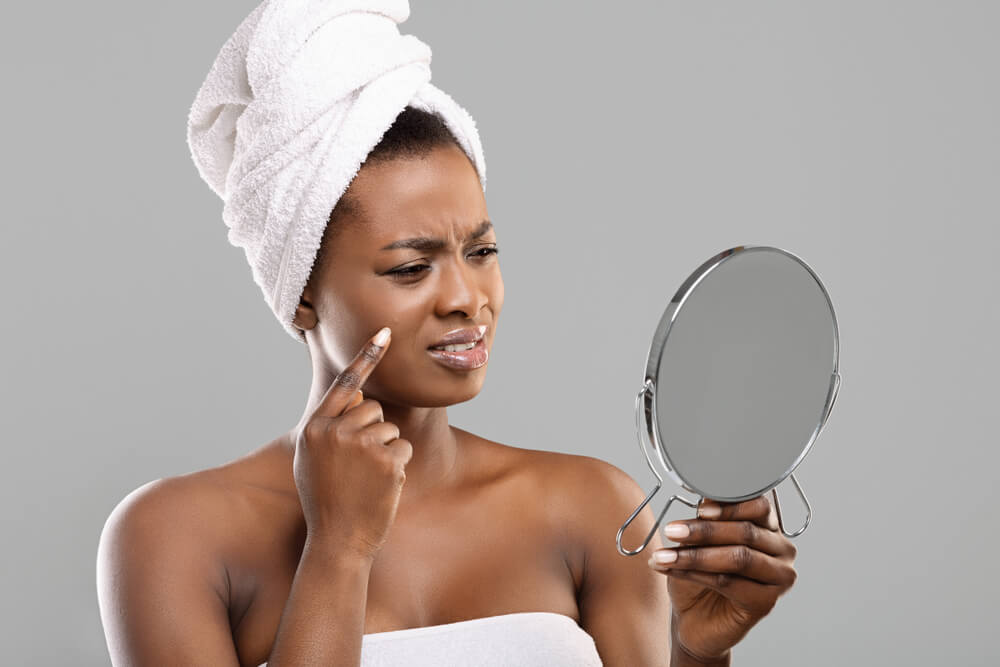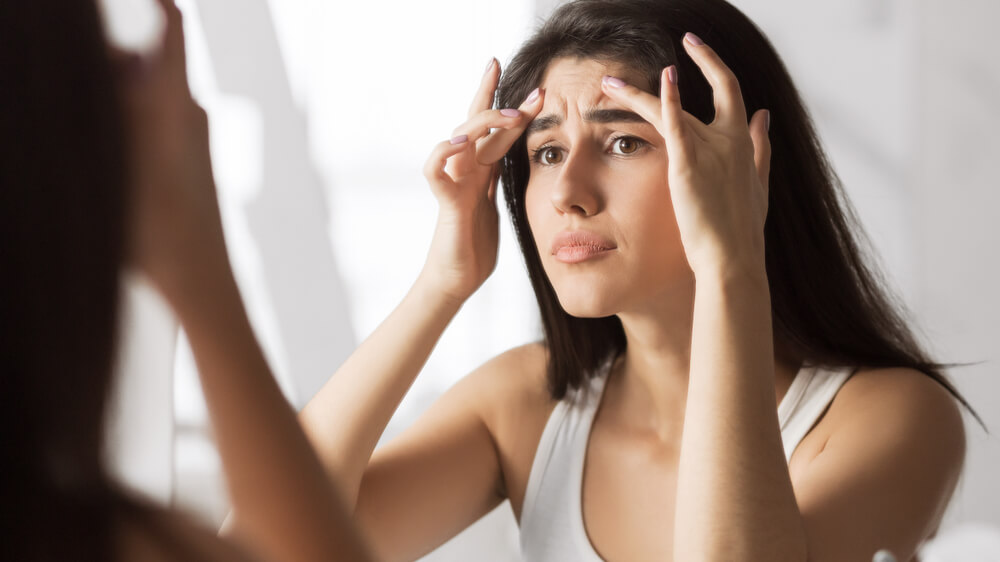
Many people believe that if you have oily skin, it couldn’t possibly get dehydrated. Right?
Wrong.
With the changing of the seasons and with the influence of different factors, many people suffer from skin dehydration, whether they have normal, dry, oily skin, or a combination of the three.
The struggle with this skin condition is real, and in order to achieve well-hydrated skin, you have to first understand your skin type and its condition, and take effective steps towards solving the problem. Don’t worry if this sounds confusing – Vine Vera is here to help! Read on to learn more…
How to Deal with Oily Dehydrated Skin

We’ll explain more about how to pinpoint whether your skin is oily and dehydrated further down. However, if you already know that you’re in this boat, here’s what you can do about it:
Use a Mild Cleanser
When we say mild cleanser, we mean a cleanser that is devoid of all the heavy, harmful chemicals. Until your skin restores its water, try to use a gentle cleanser, such as the Vine Vera Resveratrol Vitamin C Cleanser.
And, don’t forget, the water with which you clean your face mustn’t be too hot, or too cold, it needs to be just right, or in this case, lukewarm.
Use a Serum
If you add a serum that specifically targets dehydration to your skin routine, you are increasing your chances of solving the problem faster. Unlike moisturizers, a serum penetrates the skin faster due to its smaller molecules, and helps your skin better retain water. If you don’t yet have a go-to serum, give the Vine Vera Resveratrol Vitamin C Serum a try!
Moisturize
Many are fooled by thinking that if they have oily skin, they mustn’t moisturize. However, moisturizing helps our skin retain moisture more effectively. Be sure to look for a good moisturizer that is made for oily skin. That way, you will regulate that shiny finish, while also hydrating your skin.
One good example would be the Vine Vera Resveratrol Chianti Morning Recovery. Not only does it contain plenty of moisturizing ingredients, but it’s also formulated with licorice root extract, which leaves skin looking brighter.
Don’t Forget About Sun Protection
The sun will only worsen both your oiliness and your dehydration, making sun protection a must. While a dedicated sunscreen is great, it can sometimes be more convenient to use a moisturizer that already contains SPF. This way, each time you reapply it, you’ll also be hydrating your skin a little bit more.
SPF30 is the way to go, such as with the Vine Vera Resveratrol Cabernet Replenishing Moisture Cream SPF30. This moisturizer/sunscreen doesn’t contain any pore-clogging ingredients, yet it’s still incredibly hydrating. This makes it a great choice for those with oily and dehydrated skin.
How Many Skin Types Are There and Which One is Mine?

In order to determine which type your skin belongs to, you need to observe several factors – how much water there is in your skin, how oily it is and how sensitive it is. The water in the skin determines how elastic your skin is going to be, and the oil its softness.
Although we would all like to have the normal skin type and be devoid of all the troubles that go with for example, dry or oily skin, not many are fortunate enough. Yes, normal skin is not an attribute of the majority, whereas oily and dry skin is.
But let’s first go back a notch and see what skin type you actually are.
Normal Skin Type
The main feature of this skin type could be described in the same way Goldilocks describes the beds in the bears’ house: not too soft, not too hard, but just right.
Indeed, if you have a normal skin type, you certainly have a perfect balance of softness and firmness, and oiliness and dryness. You show no or little sensitivity to outer or inner irritants, and have a radiant complexion with barely visible pores.
Oh, how we envy you!
Dry Skin Type
Having dry skin could be painful most of the time, because the dryness of the skin affects its elasticity. Namely, if you have dry skin, you are more likely to have significantly less elasticity which can, more often than not, cause very painful skin breakage.
The complexion of people with dry skin usually feels dull and rough. The skin is covered with red patches, especially in the winter month, when every type of skin is especially prone to get drier. This part of the year is particularly problematic and painful for the people with dry skin.
The other factors that usually make matters worse are: genetic predisposition, hormonal changes, UV rays, long hot baths and some ingredients in the products you use on your skin, which can cause your skin to show signs of irritation.
Unfortunately, due to your skin losing its elasticity, you are more likely to have visible lines and other signs of aging.
In order to solve these problems, you have to help your skin stay hydrated. Rich skincare products that are designed for dry skin are what you need, such as the Resveratrol Pinot Noir Longevity Cream from Vine Vera.
Oily Skin Type
If you are asking yourself who is having a rougher time, people with dry or oily skin, the answer is – everybody! Each side has its own problems.
The main features oily skin are enlarged pores, dull complexion or an overly shiny one, blackheads and other skin blemishes. Oily skin is more prone to acne breakouts. The reason for this lies in the fact that oily skin produces extra sebum which is clogging the pores, and causing inflammations.
The level of “oiliness” of your skin can change during time, and can be a consequence of many different factors: puberty, stress, hormonal changes, too much humidity, or a wrong product you are applying on your skin.
In order to look after your oily skin, you need to wash it regularly, exfoliate at least once a week, and, for crying out loud, don’t ever squeeze the pimples, because if you do, it will take you forever to heal.
We should always look on the brighter side, though. Oily skin is less likely to get wrinkles.
Combination Skin Type
This type of skin has all of the features of all the different skin types. One part of the skin can be normal, the other part oily and the other one extremely dry.
People with combination skin usually have problems with their T-zone (nose, forehead and chin).
Unfortunately, the range of problems one might have with this type of skin is very wide. You could have enlarged pores and acne breakout on one hand, and skin breakage on the other.
The proper way of treating this type of skin includes different types of products and individual treatment for different zones.
Skin Condition vs. Skin Type

Now that we have explained the difference between different skin types, we hope that you have managed to determine which one is yours.
When we talk about skin, it is important to make a difference between your skin type and the skin condition you might have.
Skin type includes the general features your skin has, whereas skin condition is something you might get due to different external and internal factors, and it is usually of temporary nature.
The external factors that cause the appearance of a certain skin condition include: poor nutrition, climate, exposure to outer irritants and your skincare routine. On the other hand, internal factors include the fluctuation of hormonal levels, stress levels and natural aging process.
There are five basic types of skin conditions and those include aging skin, dehydrated skin, sensitive skin, skin pigmentation and blemish prone skin.
Aging Skin
Even though there are other types of skin conditions that are more serious, this one seems to affect us the most. Throughout years, decades, even centuries, emphasis has been put on slowing down the aging process, and making your skin look younger and fresher. That is why it comes as no surprise that most skincare products today are designed to slow down the ageing process.
(If you’re looking for a product that’ll reduce the appearance of fine lines and wrinkles, try the Resveratrol Vitamin C Moisturizer from Vine Vera.)
Sensitive Skin
If you easily break out in rashes and if your skin is itchy most of the time, then you are considered to have sensitive skin. Unfortunately, this condition has a number of possible causes ranging from genetic factors to different environmental influences. In order to take care of this condition and relieve yourself of uneasiness and discomfort you might have, it is best to try to avoid the detrimental outside irritants and apply different skincare products.
Skin Pigmentation
Next to aging skin, this is one of the conditions that troubles people the most. Hormonal changes and genetic predisposition are the likeliest reason behind the change, as well as UV radiation which is only making it worse. UV rays cause the overproduction of melanin, which is responsible for the color of your skin. By adding any product that has additional Vitamin A in it, you could find a solution to your problem and get a nice and radiant complexion.
Blemish-Prone Skin
This condition is mostly found with people with oily skin. It occurs when the area around the hair follicles gets congested with oil and dead skin cells. Various factors affect your skin to become blemish-prone – hormonal changes, diet and environment.
Again, salvation could be found in finding a proper cleanser and adopting a proper skincare routine which will clean your skin properly and give it appropriate nourishment.
Dehydrated Skin – Everybody’s Problem
Dull and tired skin is certainly something that nobody wants to have. However, when your skin has problems with keeping the moisture in, it begins to flake and crack. Those are the first signs of your skin lacking moisture.
As it has previously been mentioned, even though there is a misconception that only people with dry skin suffer from dehydration, this is not true. Every type of skin can suffer from dehydration, even the oily one.
Signs Your Oily Skin is Dehydrated

Think that your oily skin may be dehydrated? Here’s how to know for sure…
The Appearance of Dark Circles and Dullness
When your skin is dehydrated, it loses its radiance.
When this happens, your complexion usually appears very dull. In addition, there is a chance that the dark circles under your eyes become more noticeable.
Your Skin Becomes Itchy and Irritated
Without water to hydrate the barrier layer of your skin, the layer that protects your skin from outer irritants, these irritants are more likely to penetrate the skin and cause damage. Itchiness and irritation are soon to follow as a response to the changes.
Breakouts
As it has been said, when oily skin becomes dehydrated, it generally tries to compensate for the lack of water by overproducing oil. However, this increased amount of sebum is what causes problems to people with oily skin to begin with. It clogs the pores and creates a fertile ground for various bacteria to flourish and cause infections. As a result, acne breakouts appear more intensively.
Fine Lines and Wrinkles
Even though we have mentioned that the benefit of oily skin is that signs of aging come much later, unfortunately, if you are suffering from dehydrated skin, you are also going to notice the appearance of fine lines and wrinkles.
Dehydration influences both the surface and deeper layers of the skin and, therefore, causes the deeper lines to become more visible. Luckily, their noticeability diminishes significantly once the skin is back to a state of hydration.
Reasons for Dehydration
Outdoor Irritants
If you think only sun rays can draw water out of your skin, you are wrong. There are many environmental factors that cause water shortage in the layers of your skin. Dry wind and air can also cause the water to be released from your skin easily, causing itchiness and irritation.
Poor Diet
Unhealthy food and beverages are the reason behind many health issues and conditions people have today. So, it is not surprising that skin dehydration is one of them. Overconsumption of coffee, alcohol, fast food and sweets can disrupt metabolic processes, and, among other things, it may cause your skin to lose the water it needs to be healthy and fresh-looking.
Hot Showers and Baths
Who would have thought, right? Unfortunately, it is true. When you expose your skin to hot water, it removes the protective oil layer from your skin, which is responsible for retaining water. This way, your skin is more likely to lose the water, making your skin dehydrated.
Inappropriate Skincare Routine
Sometimes, by trying to remove the excess oil from the surface of their skin, people do more harm than good. You might use cleansers that are just too drying and irritating or scrubs that are just too harsh, thinking that you will remove the excess sebum more effectively, but this is only going to have a counter effect.
Skin is a delicate organ, and it needs to be dealt with carefully and mildly.
One more mistake people with oily skin are making is that they are using products which have high amounts of alcohol in them. Alcohol is an extremely drying substance, and causes your skin to lose water fast.
Hopefully, by following the above tips, you’ll be able to keep your oily skin hydrated and enjoy a healthier-looking complexion for years to come!




 A.U.
A.U. B.R.
B.R. C.A.
C.A. M.X.
M.X. C.H.
C.H.

